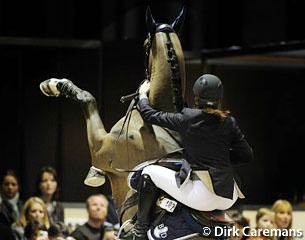
There are sonnets written and phrases coined that teach us to reach for our full potential, to never give in, never give up, to never say never, and to never admit defeat. I agree that we should all strive to be the best we can be and grow together with our horse in order to allow him to also become his very best self.
However, I once spoke about not letting your ego get in the way, and along the same lines is learning the art of blocking out the world around you and making the decision what is right for you and your horse at any moment in time.
This often means that you may be criticised, critiqued, or written off by others who will see you as admitting defeat, giving in to fear or doubt, or whatever it may be that is nagging at you. The best way to overcome these nay-sayers, is to come back stronger and more determined with a horse that will remain healthy and happy long after those that have forged ahead towards forced and hurried success.
This concept starts at a very basic level and can be seen at all stages and in all scenarios of dressage training and dressage sport; even riding at home for your own enjoyment. It’s the ability to understand and acknowledge your own limitations as a rider and understand and acknowledge those of your horse! Sounds simple, but finding the very delicate line between pushing yourself and your horse to reach your potential and pushing yourself and your horse too far is very hard to define. It requires trust in your horse, understanding of you and your horse, and courage to block out the opinions of others and follow your own heart.
We have all seen horses lose their minds in a test, or in a warmup, and we have seen riders who inexcusably lose their minds on top of a horse. Is this because they are frustrated at their own inability, or their horses? Or can they just not see, or feel, or accept their limitations?
This concept is a fundamental aspect of training and the top riders -- the riders with feeling and humility -- know when to ask, how much to ask, and when to say, "well I’m not technically good enough at this time to ask more," or "my horse is not physically or mentally capable of accepting more at this time."
A top rider will teach a horse piaffe and will ask for a few steps, and he gets those few steps, he will ask a few more steps. He will then celebrate the horse, and ask for more when the horse is ready. “Ask for much, be content with little, and reward often," my idol Nuno Oliveira stated.
If a rider asks for piaffe and the horse rears up, tenses up, runs backwards, or all of the above, a rider with self-awareness will say, “hmm, I need help asking for piaffe, as my horse clearly is not understanding me.” A rider who knows nothing of their limitations or their horse's will keep adding pressure and continue to ask, until the horse's eyes are popping out of his head and he’s gone almost cross-eyed with confusion.
I have been met with this concept time and time again and the truth is no-one else can judge you on your decisions on the horse, and no-one else can know what you feel or what you are capable of but you. We all have to be able to accept a challenge, but we also need to be able to accept when we need to ask for help.
If you have a horse that can get excited and you arrive at a competition and he looks like he’d quite like to go for a 5-mile galop, decide if you can physical and mentally cope with him and if you know that you cannot, then lunge him, or get someone to help you. People will say you are weak, and perhaps a coward, and that you should just get on and hold on. What does that prove? A horse, if he has spirit and enthusiasm, will always want to see new sights and what is the point of beating that out of him?
Or if you love your horse, and need to make a decision such as gelding or getting someone else to hop on every once in a while, then good on you for knowing yourself, and taking action to help you and your horse enjoy your time together. I’m not saying that you wrap you and your horse up in bubble wrap and never go outside your arena. Just learn to accept the signs of what your horse is telling you, or if you don’t understand, stop and ask yourself one very simple but incredibly complex question: Am I going beyond my own limitations at this point in time? Am I pushing my horse beyond his limitations at this time? The answer may only be yes for now, but if it is yes, seek out help, so that next time the answer is, “no way, that limitation is long gone and I’m ready for the next one!”
By Sarah Warne for Eurodressage - Photo © Dirk Caremans
Related Link
Sarah Warne's Classical Training Articles